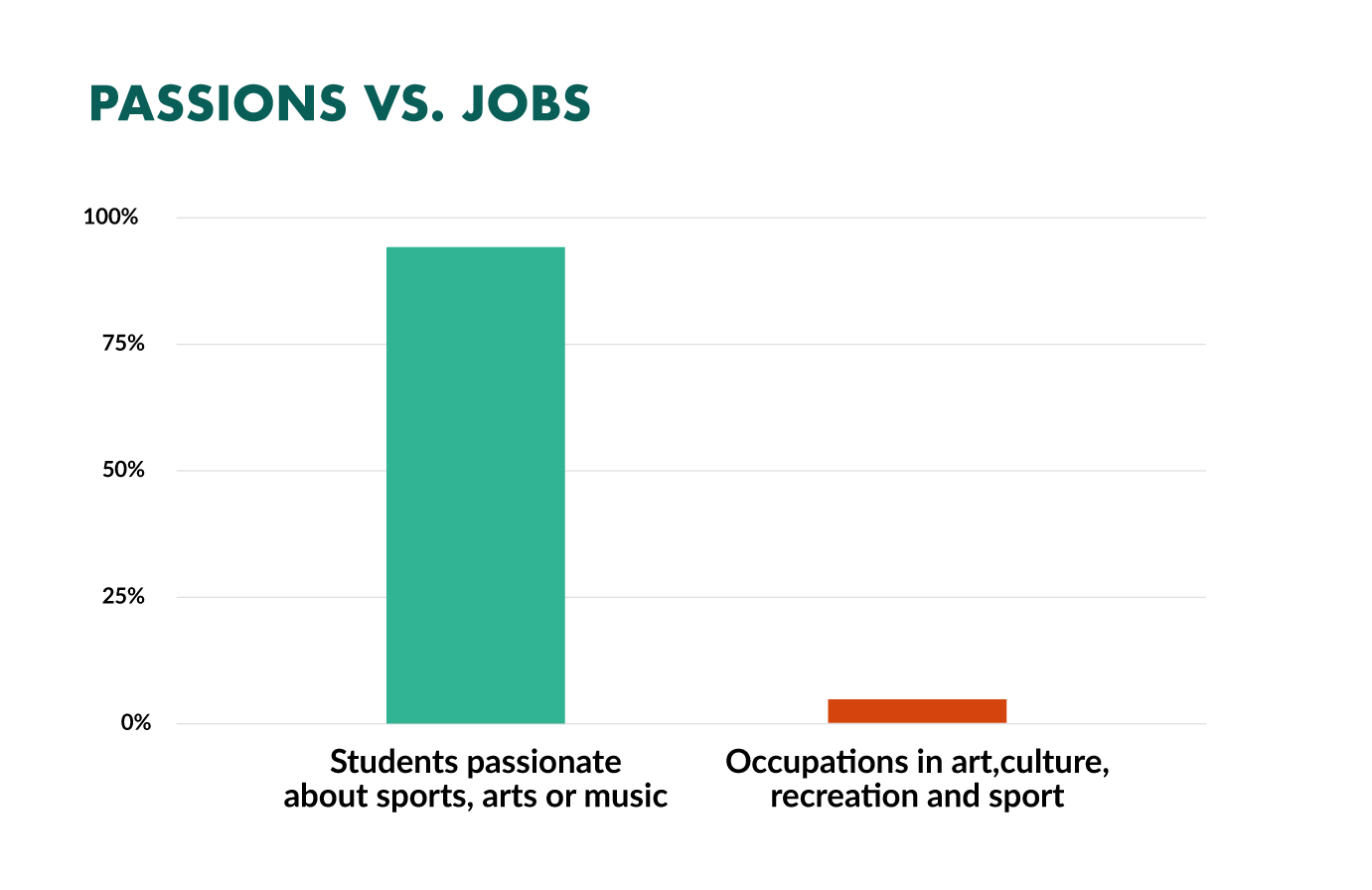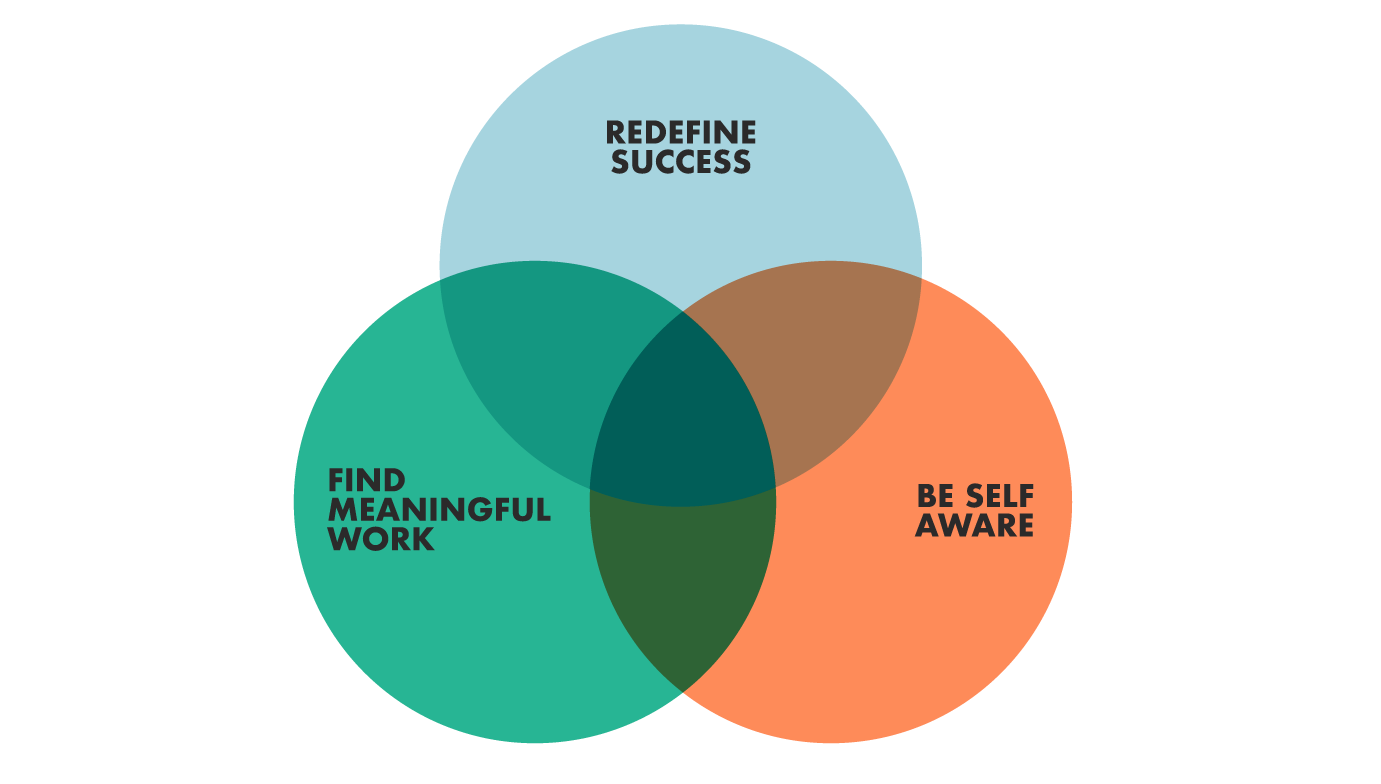Happiness at Work: Why The Next Generation Chooses Purpose Over Profit

We’re entering a new era of business.
One that isn’t driven by money or greed.
But by purpose.
Being purpose-driven means having a reason to live.
It means doing something that has a positive impact, not just for yourself.
When most people hear the term “purpose-driven work” they think of aid workers, who are on a noble mission to eliminate corruption, poverty and hunger in a third world country.
If that’s you, we thank you and applaud you.
But you can also find purpose in your everyday work.
Finding your Ikigai
One-third of our lives are dedicated to work.
In fact, we will spend close to 100,000 hours at work in our lifetime, which is why it’s even more important to do something you find fulfilling, something that has a purpose.
While many people have a “live for the weekend” mentality, having a purpose means celebrating the start of the week. Every Monday, you wake up excited, you see an opportunity and there’s real motivation to doing your work. It means you’ve found your Ikigai - Japanese for “reason to live”.
"The real joy in life comes from finding your true purpose and aligning it with what you do every single day."
Yet, millions of us struggle with deciding what we want to do with our lives.
Most career advice suggests that you follow your passion in life.
But that advice isn’t always right.
Passion vs. purpose
We've all heard the advice, “just follow your passion” as if it’s the secret to success.
And while it might sound like inspiring advice, it doesn’t work in the real world.
In a survey among 500 students, a research firm 80000hours.org found out that there’s a huge disparity between what students were passionate about and the number of jobs available for their chosen passion.
An overwhelming 90% of the students were passionate in sports, arts and music.
And yet, only 3% of available jobs were in these fields.
The reality is: “following your passion” is a fast track to high unemployment rates.

Harvard Business School professor Jon Jachimowicz offers a simple, research-backed suggestion. “Focus less on what makes you feel passionate, and more on what you truly care about”.
“By focusing on purpose, you align your work with your deepest values, and also relieve yourself of the expectation that the long slog of a career will be all (or even mostly) happiness and sunshine.”
But, what’s the difference between passion and purpose?
Ultimately, it comes down to this:
- Passion is about you. It’s what you enjoy (a hobby). It’s selfish.
- Purpose is about them. It’s how you can help and support others. It’s selfless.
Here’s a practical example.
- Passion: You’re a business owner who loves to look at numbers and analyze data. You enjoy reading reports, presenting to your team and making informed decisions on how to improve the business. You have a direct influence on growth.
- Purpose: Many businesses struggle with interpreting data and performance into insights and their strategy. Using your knowledge and experience, you help other business owners use data to drive the growth of their business. Higher business growth leads to more employment opportunities in your local community.
Purpose is altruism in its truest form – a selfless act of helping others without any expectation to benefit from it.
Let purpose be your North Star!

Finding your purpose
Finding your purpose doesn’t happen overnight.
It starts by asking yourself a few key questions about your work and personal life.
These questions are:
- What are your personality strengths and skills?
- What kind of experience do you have?
- What interests do you have, and would you like to pursue them?
- How do you spend your free time?
- If money was no object, what would you be doing?
- What is your greatest accomplishment? How did you succeed?
Of course, these questions were never going to be straightforward (or easy).
It takes a real commitment and a complete understanding of who you are to answer them.
To help you find your purpose, we’ve grouped these questions into 3 key areas: self-awareness (personality, skills); meaningful work (experience, interests); and redefining success (accomplishments, success).
Let’s take a closer look at each of those areas.
Get the latest Thrive with SuperOffice articles in your inbox. Join here
1. Being self-aware
Self-awareness is an important factor in how we think, how we feel and how we react to our thoughts. It’s about having a clear understanding of who you are – your strengths, weaknesses, thoughts, motivations and emotions. This allows you to understand other people, how they perceive you, your attitude and your response in the moment.
Why does being self-aware matter?
Being self-aware helps you:
- Become more proactive, boost acceptance of others and encourage positive self-development.
- Work creatively and productively, and experience pride in yourself and in your work (which also builds self-esteem).
- Become better/faster at decision-making.
- Improve how you communicate in the workplace, as well as enhance your self-confidence and well-being.
- Build long-lasting relationships (both personally and professionally).
Although most of us believe we are self-aware, only 10 to 15% of us actually are, which means the majority of us are not realizing our full potential.
So, how do you become more self-aware?
There are 6 ways for you to improve self-awareness in the workplace.
1. Leave your ego at the door. When you become self-aware, it allows you to be more realistic about yourself, which builds trust and respect from others due to a lack of ego. Teammates, colleagues and senior leaders are much more likely to respect and admire someone who knows their strengths and weakness and is open to ask for ideas and seek guidance from others within the organization.
If you are self-aware to know what your strengths are, you understand when to apply them and more importantly, when to draw strength from others.
2. Practice mindfulness. We spend most of our lives in our head and with our own thoughts, instead of being present and actively listening to, and responding to your colleagues. We communicate through words, facial expressions and body language, so be mindful of all forms of communication when you interact with colleagues.
3. Be adventurous. How do you know what you’re good at? How do you know what you like? It’s by trying new things and then analyzing how we feel about it that gives us confidence in the skills we excel at. And also helps us improve in areas where we need more experience.
4. Embrace failure. We’re taught from an early age that failure is bad. But that’s the only way we can grow. Don’t be afraid to make a mistake, understand what that mistake was and learn from it so you don’t repeat it. All the great success stories come from people who have failed time and time again. Failure is a humbling, but necessary process.

"I can accept failure; everyone fails at something. But I can’t accept not trying.”
5. Ask for feedback. Find people who you have a strong relationship with or whom you trust and ask them what they think you’re good at (strengths) and what they think you might not be so good at (weaknesses). Now, this could be personal attributes, too. Also, one way to keep the feedback honest is to collect it anonymously – as anonymous feedback tends to be more insightful and helpful.
6. Evaluate yourself. Writing is a therapeutic process. If you’ve taken on a new project or you are looking at a new career opportunity, write down what you expect the end-result will be. Then, after 3-6-9 months, go back to your notes and compare what you expected to happen versus what actually happened. Once you have the “What”, ask the “Why” – as that’s how you truly reflect and evaluate.
Once you become self-aware, finding a purpose becomes a lot easier.
Especially when you begin your quest to find meaningful work.
2. Find meaningful work
Meaningful work is specific and personal to the individual.
What is meaningful to you might be different from your colleague. Therefore, you must be searching for roles that are important to you, if you are to succeed. It’s about understanding who you are as a person and what you value (self-awareness).
Finding your work worthwhile, feeling that it benefits our society or that you’re doing something others appreciate is becoming a key driver in why people choose how they want to work. It’s providing the biggest increase in happiness at work.
Of course, everyone wants to find purpose and meaning in their career, but how can you achieve it? Are there practical steps you can take to make sure you’re not just waiting for it to happen - because we’ve got news for you - it won’t.
Unfortunately, no one teaches us how to find a meaningful job.
More often than not, we choose a job based on salary, location, career prospects. But these things rarely translate into long-term job satisfaction.
If you want to find meaningful work, something you genuinely care about, then you have to take action. Here are 6 principles you can use to find meaning at work.
1. Understand what meaning is to you
Finding meaningful work means different things to different people. So, you need to understand what it means to you.
According to Nathaniel Koloc, CEO of ReWork, there are four categories to consider:
- Legacy. What do you want to achieve? What do you want to be remembered for?
- Mastery. What do you love doing? What are you doing to improve that skill?
- Freedom. Does the work provide you with the benefits for the lifestyle you want to live?
- Alignment. Do you feel like you belong in the work/ environment? Do your values align with those around you?
The answers to these questions will vary depending on each person. However, if you’re looking for meaningful work, answer these questions and then prioritize the categories based on how you value them into a list.
This list will help guide your decisions and can be used to evaluate future opportunities like a new project in your current role, a job at a different company, or a new career path.
2. Find what makes you happy
Think about the last week: what made you happy and fulfilled? What tasks did you perform that you enjoyed doing? What tasks did you do that you found frustrating or difficult? Write them down.
Try to find a commonality between the things that make you happy and that you enjoy.
For example, let’s say you currently work in customer service. You enjoy writing and communicating with customers, but you find inbound calls frustrating as one of your weaknesses is communicating in real time over the phone.
In this case, a role in marketing might make you happier. You still get to write and communicate, without the worry of speaking with customers over the phone.

"The Holy grail of life, professionally, is to love what you're doing and be good at it."
3. Try it. Gain experience
If we use the example above, you could reach out to the marketing department and ask them if you can support them with new content, an email marketing campaign or a press release. If that’s not an option, then create a “side hustle”. You could contribute to one of the many business community websites online or offer your “writing services” to friends, family or connections on LinkedIn or Facebook.
Another way to find out if it’s the right fit for you is to speak with people you admire that have taken the same career path. Whether it’s content marketers, freelance writers or bloggers. Reach out to them, connect and if possible, meet with them in person and listen to their story on how they view the career you’re looking to follow.
4. Manage your finances
Most people abandon their quest for meaningful work because they can’t afford to spend 12-18 months searching for it. Try to form a financial cushion for yourself so that when you do take the leap, you have enough money saved and a financial buffer to act on it!

"You know you are on the road to success if you would do your job, and not be paid for it."
5. It’s never too late
Of course, it’s easier to take more risks when you are in your 20’s, but the way of working until 65 and retiring is over. In many cases, you may not even retire at all!
If you are 50 years of age, you still have another 25 to 30 years of your work life ahead of you. Think about it. Twenty-five more years. It's not too late to find a new purpose. Your purpose. Wouldn't you like to do something meaningful for the next three decades?
6. Take time to reflect
Whether it’s once per week, or once every few weeks, schedule time in your career to reflect on your progress. Sometimes, even if it’s just for a few minutes, giving yourself time to reflect allows you to see what’s working and where you can improve. Finding meaningful work is an ongoing journey. Being able to reflect allows you to change course when needed so that you can remain on the right career path.
Finding meaningful work gives you a sense of purpose, but is that enough?
Would you consider yourself successful? Well, it depends on what success means to you.
3. Redefine success
Success is typically defined by winning.
Winning in life, your career and, in many cases, winning at all costs.
But when someone wins, someone else loses. And from an early age we’re taught that losing equals failure.
- Not top of the class in Science? Failure
- Third place finish in the 100m sprint? Failure.
But it’s not just something we hear when we’re young. The same applies later in life, too.
- Laid off from work? Failure.
- Didn’t get that promotion you wanted? Failure.
And so on…
It’s winning vs. losing. It’s success vs. failure.
"Failure is not the opposite of success, it's part of success."
You are in control of your life. The way you define success, your life goals and accomplishments are yours to own, not someone else’s.
This is why being purpose-driven starts by becoming self-aware and finding meaning work in your work. Once you have those two in place, you realize that success is no longer about status, wealth or recognition. It’s about what you want.
When you have a purpose, know who you are (self-aware) and, are doing something that provides fulfillment and joy in your life (meaningful work), you are successful.
"Success is liking yourself, liking what you do, and liking how you do it."